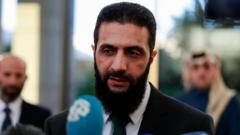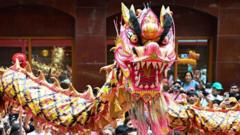As Syrians flooded the Umayyad Mosque in Damascus for the first Friday prayers since the fall of the Assad dynasty, emotions ran high. Celebrating newfound freedom, the event marked a pivotal shift for the war-torn nation grappling with a complex future involving sectarian divisions and international interests.
Rebirth Amidst Ruins: Syrians Celebrate the End of Assad's Regime

Rebirth Amidst Ruins: Syrians Celebrate the End of Assad's Regime
In a moment of collective joy, thousands of Syrians gather for the first Friday Prayer post-Assad, marking a historic transition filled with hope and uncertainties.
Amidst the backdrop of historic change in Syria, throngs of jubilant citizens gathered at the iconic Umayyad Mosque in Damascus for the inaugural Friday Prayer following the ousting of Bashar al-Assad. A palpable sense of excitement coursed through the crowd as people waved revolutionary flags, posed for photographs, and chanted praises celebrating the collapse of an authoritarian regime that had held power for over fifty years.
The atmosphere was electric, not only for the spiritual significance of the event but because it signified a collective sigh of relief for many who had long been oppressed by Assad's regime. For years, fearful of brutal reprisals from Assad’s security forces, these worshippers had avoided public gatherings. But now, they openly celebrated their newfound freedom, some shouting, “Hold your head high, you are a free Syrian!” The unusually large congregation at the mosque, where anti-government protests were once violently suppressed, stood as a testament to the momentous change sweeping across the nation.
Leaders of the transitional government were also present, reinforcing the communal spirit as various groups, previously at odds amidst Syria's sectarian strife, came together in their quest for a unified future. Amidst the celebrations, Ahmed al-Shara, the radical Islamist rebel leader credited with the regime's downfall, called for continued unity among the Syrian people, asserting, “Now we will turn to building the country.”
However, the jubilant mood in Damascus was shadowed by a complex landscape of challenges. As the new leaders grapple with authority in a nation scarred by civil war and sectarian divides, questions loom over how various factions will coalesce into a cohesive government. In a broader context, international dynamics complicate matters with multiple powers, including Turkey, the US, and Iran, seeking to establish influence in post-Assad Syria.
Meanwhile, escalating tensions in the surrounding regions foreshadow further complications. US Secretary of State Antony Blinken recently met with Turkey’s Foreign Minister in Ankara, emphasizing the importance of preventing the resurgence of groups like the Islamic State, amidst fears of potential instability in the power vacuum left by Assad's departure.
The implications of Assad’s removal echo beyond the religious and cultural sentiments in Damascus; they call for a reevaluation of Syria’s international relations. Regional actors slowly begin to extend gestures of cooperation, complicating the dynamics as emerging factions strive to navigate a path forward.
As the sun set over Damascus, the celebrations served as both a profound marking of freedom and a wake-up call to the uncertainty that lies ahead. The people, armed with aspirations for democracy and healing, now face the reality that their journey to a stable and peaceful Syria is just beginning.
The atmosphere was electric, not only for the spiritual significance of the event but because it signified a collective sigh of relief for many who had long been oppressed by Assad's regime. For years, fearful of brutal reprisals from Assad’s security forces, these worshippers had avoided public gatherings. But now, they openly celebrated their newfound freedom, some shouting, “Hold your head high, you are a free Syrian!” The unusually large congregation at the mosque, where anti-government protests were once violently suppressed, stood as a testament to the momentous change sweeping across the nation.
Leaders of the transitional government were also present, reinforcing the communal spirit as various groups, previously at odds amidst Syria's sectarian strife, came together in their quest for a unified future. Amidst the celebrations, Ahmed al-Shara, the radical Islamist rebel leader credited with the regime's downfall, called for continued unity among the Syrian people, asserting, “Now we will turn to building the country.”
However, the jubilant mood in Damascus was shadowed by a complex landscape of challenges. As the new leaders grapple with authority in a nation scarred by civil war and sectarian divides, questions loom over how various factions will coalesce into a cohesive government. In a broader context, international dynamics complicate matters with multiple powers, including Turkey, the US, and Iran, seeking to establish influence in post-Assad Syria.
Meanwhile, escalating tensions in the surrounding regions foreshadow further complications. US Secretary of State Antony Blinken recently met with Turkey’s Foreign Minister in Ankara, emphasizing the importance of preventing the resurgence of groups like the Islamic State, amidst fears of potential instability in the power vacuum left by Assad's departure.
The implications of Assad’s removal echo beyond the religious and cultural sentiments in Damascus; they call for a reevaluation of Syria’s international relations. Regional actors slowly begin to extend gestures of cooperation, complicating the dynamics as emerging factions strive to navigate a path forward.
As the sun set over Damascus, the celebrations served as both a profound marking of freedom and a wake-up call to the uncertainty that lies ahead. The people, armed with aspirations for democracy and healing, now face the reality that their journey to a stable and peaceful Syria is just beginning.



















